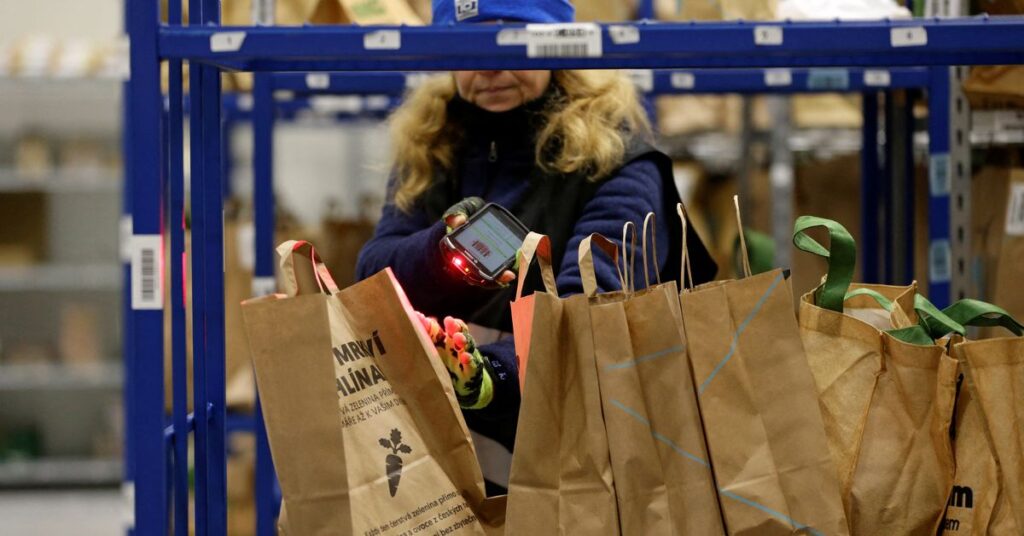PRAGUE, March 1 (Reuters) – Two Czech online grocers – one a start-up “unicorn”, the other backed by a billionaire businessman – are taking on Europe’s biggest supermarkets to feed growing appetite for home grocery delivery.
Market leader Rohlik Group is setting its sights on Germany, while local rival Kosik pushes eastward.
Founder and Chief Executive Tomas Cupr said Rohlik was focused on turning a profit in Europe’s biggest economy after postponing plans to expand in Italy, Spain and other markets as inflation and the Ukraine war cloud the economic outlook.
“We will go much deeper in Germany than wider in markets we wanted to a year ago,” Cupr told Reuters, adding the company has contracted sites for fulfilment centres in Cologne, Essen, Berlin and Düsseldorf, where it plans to launch.
“Europe is a 1 trillion euros in grocery sales market. You are looking at a blue ocean.”
Last June, Rohlik raised 220 million euros in a Series D financing round led by Belgian investor Sofina <SOF.BR>. This put the firm’s valuation above a 2021 round that had made it a rare “unicorn” among start-ups with a valuation of 1 billion euros ($1.06 billion).
Latest Updates
View 2 more stories
Rohlik and rival Kosik, backed by Czech billionaire Daniel Kretinsky, are both seeking to apply models that have been successful at home.
Although small in size, the Czech grocery delivery sector has developed faster than others in a fragmented European market that is expected to grow to $121 billion over the next four years from a current $73 billion, according to Statista.
HUGE GROWTH POTENTIALRohlik, founded in 2014, leads the Czech market by mainly targeting customers in big cities through its string of distribution warehouses. It operates in Munich and Frankfurt under the Knuspr.de brand.
Last year, the privately-held company drove revenue 33% higher to 574 million euros. Cupr said it had generated profit in its home market but posted an overall operating loss as it pursued expansion.
He said succeeding in Germany over the next two years would help raise capital for a further push by the grocer, which is active in Hungary and Austria and has a small pilot programme in Italy. It has also laid the groundwork to open up in Spain.
“Once we prove Germany we will probably get money for other markets,” he said. “We will keep pushing on that infrastructure and profitability and then we will accelerate. Three years is the time to start selling everywhere.”
The proportion of shoppers using online grocers is estimated at less than 10% across most of Europe, according to data cited by McKinsey, and at just 4% in Germany. That means the potential for growth is massive, in a market that lacks dominant players, analysts say.
McKinsey estimates 18-30% of grocery sales could be online in Europe by 2030 – a huge prize for companies able to overcome the costs and logistical challenges of providing speedy service at prices competitive with bricks-and-mortar supermarkets.
“The online grocery market opportunity is a clear no-brainer but the key question is whether companies should focus on being a clear leader in one market or focus on more,” said Ingmar Wegel, a director at investment bank Clipperton in Germany.
“Competition is still mainly driven by stationary retail but a small number of online grocery players are gearing up in each market to become leading e-grocery platforms.”
KOSIK TURNS EAST
As Rohlik bets on Germany, Kosik is looking eastward, entering the Slovak market and expanding in Bulgaria.
CEO Ivan Utesil said the company would also seek to cut into Czech market share by capitalising on its tie-in with German wholesaler Metro (B4B.DE) in some regional areas.
Metro, in which Kretinsky also holds a major share, announced in January that it had acquired a 25% stake in Kosik, aiming to become a stronger partner and improve the online grocer’s sourcing capabilities.
“The infrastructure is a great enabler for us to expand,” Utesil told Reuters. “This model (of using Metro stores in regions) enables fast rollout. It is not capital-heavy.”
Germany is not yet on Kosik’s radar, he added, although it will eventually turn its attention to other central and eastern European countries.
“Bulgaria and Slovakia is our focus for end of this year and beginning of the next,” Utesil said. “With our strategy, we are confident we will be able to grow at least 30-40% a year, some of it being organic and some of it from expansion.”
Many big supermarket chains do not have distribution centres, which analysts say limits their ability to expand delivery networks and gives an edge to companies like Rohlik and Kosik that are focused on building infrastructure.
Rohlik already has a distribution agreement with Marks & Spencer and Cupr said the company could potentially partner with other retailers.
McKinsey senior expert Tomas Karakolev said companies able to build scale quickly to cut costs and cover more delivery territory were most likely to succeed in the nascent market.
“Leading e-grocers in Central Europe are attempting to win with a sequence of local city-level games, with each one starting with the largest cities and growing until a country is covered,” Karakolev said.
($1 = 0.9411 euros)
(This story has been refiled to make clear when the company became a unicorn in paragraph 6)
Reporting by Michael Kahn and Jason Hovet, Editing by Catherine Evans
: .


